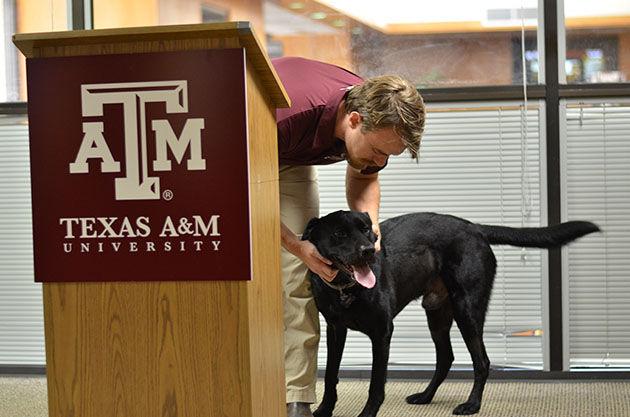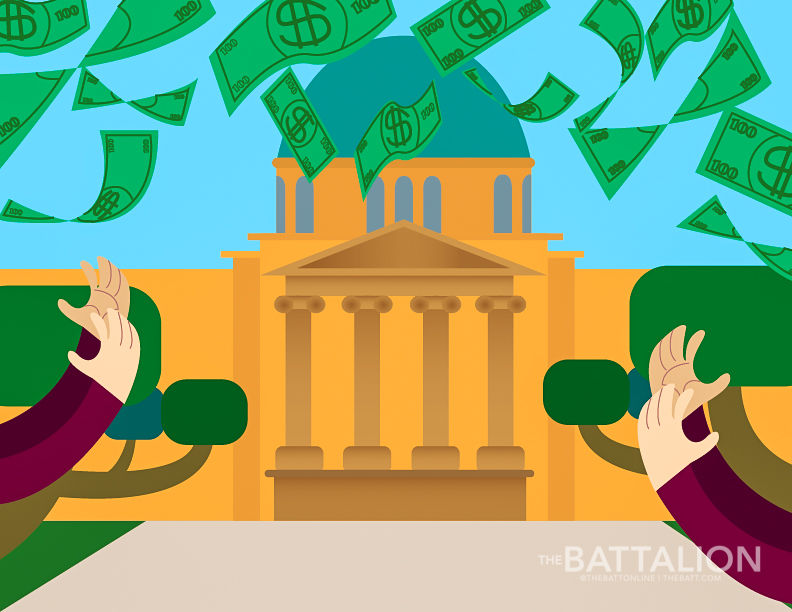The Texas A&M College of Veterinary Medicine saved the life of a combat veteran’s best friend and companion — a black labrador retriever named Hank.
Sgt. William Cole served three deployments to Iraq and one to Afghanistan and was in the military for almost six months before taking medical retirement in January 2012 due to health complications, including post-traumatic stress disorder. Cole said coming back from combat to everyday life was a rough transition.
“Like any kid, I grew up in a great house, my mom raised me right and while I was in the military I lost a friend and I think my brain was always wired on deployment mode,” Cole said. “When I got home, I had a hard time adjusting to what was normal. I really struggled with that and I had a hard time making decisions, day-to-day decisions. And it was tough.”
Cole said he tried therapy and medications to overcome his PTSD, which did nothing to help. It wasn’t until he bought a black labrador retriever in October 2012, trained him to become a registered service dog and made him his companion that life began to be a bit simpler.
“It was one of those things where I found myself getting out,” Cole said. “And then after I was getting out I found myself liking to get out. And when I did that I found myself liking to go to parks and doing just things that I wasn’t enjoying anymore. And so slowly he was able to pull me out of that little funk that I was in and it’s made a difference in my life quite a bit.”
On Sept. 28, Hank was hit by a car and taken to the veterinary hospital at A&M. Emergency Critical Care Specialist James Barr was the first to receive Hank.
“When he came in on emergency, he was in pretty significant shock when he arrived, so he was pretty severely affected,” Barr said. “It was pretty clear at the beginning that he had a collapsed lung, or a pneumothorax. So what that means is there is air outside of the lung but inside of the chest and it prevents a person or a dog from being able to breathe well so we actually were, that was the most immediate life threatening problem.”
Veterinary Resident Instructor Kathryn Kaufman tended to Hank throughout his stay in the veterinary hospital.
“Hank was brought in as a Good Sam initially,” Kaufman said. “It was one of those things where no one really knew where he was or who he was but we treated him just as we would any other dog. And so he was stabilized and he came and then finally Sgt. Cole was notified that he had been hit and claimed him.”
Cole said he wasn’t allowed to see Hank until two days after the accident.
“When Hank was first hit, I mean, I couldn’t really believe what was going on and so it was pretty tough realizing that he might, you know, that he might not make it,” Cole said.
Once Hank was released from the hospital, Cole said he knew it would be a long recovery.
“For the longest time Hank was taking care of me,” Cole said. “He worked wonders for me. He was a great dog and now there’s kind of a reversed role to where, you know, I take him down, my mom lives on the second floor of an apartment, and every day I carry him down when he has to use the restroom. I take him down the stairs.”
Cole currently lives with his mother, Maxine Cole, while he’s helping Hank recover. Maxine Cole said she has now watched both Hank and her son take care of each other when they need it the most. When Cole gets anxious, she said Hank will put his paw on Cole’s leg for comfort.
“I think the bond between the both of them has gotten stronger,” Maxine Cole said.
Eleanor Green, Carl B. King Dean of Veterinary Medicine, said it was an honor for the veterinary hospital to have helped a United States veteran in the way it did.
“We cannot thank Sgt. Cole enough for how he’s served this country, we can’t thank Hank enough for how he has served Sgt. Cole, so we’re so grateful to be a participant in this wonderful union of a dog and Sgt. Cole in making sure Sgt. Cole is whole and healthy,” Green said.
Barr said that without the medical attention Hank received for his injuries, he would never have survived.
“It’s always difficult, the relationship between an owner and their pet,” Barr said. “That’s as much of the care that we give our patients as to the owner. And so it was pretty difficult knowing what he meant to the owner so we were able to give him care like we do a lot of our patients, but Sgt. Cole did a lot for our country and so we wanted to do as much as we could do for him, for Hank.”
Cole said he plans to return to his education at A&M once Hank is fully recovered.
Thanks to A&M vets, service dog reunited with his veteran
December 3, 2014
Jonathan Sheen — THE BATTALION
Sgt. William Cole and his dog, Hank, at a media conference Wednesday.
0
Donate to The Battalion
Your donation will support the student journalists of Texas A&M University - College Station. Your contribution will allow us to purchase equipment and cover our annual website hosting costs.
More to Discover









